There’s a lot to learn on the open road. Every RV will admit that. But, what are some of the most important lessons a camper will learn after they buy their first RV?
We asked 13 popular RVers, “What’s the one thing you wish you’d known before you bought your RV?”
Some of their responses may surprise you.
Let’s take a look!

#1 Size Matters
When it comes to your RV, especially if you’re a full-timer, size definitely matters. Of course, you need to look at how many people will be traveling or living with you. Do you have toddlers who require extra storage for items such as diapers and toys?
Or are you a solo traveler needing a roof over your head and a kitchen to cook in? Will you be working in your RV? Do you plan to entertain inside if the weather’s bad?
All good questions. In addition, you’ll want to look at where you’ll want to be camping or parking. If you plan to boondock a lot, size may not matter as much.
However, space is limited in many older campgrounds like national parks, as Julie Chickery of Chickery’s Travels discovered.
“I wish we had known that most national parks have size limitations. We bought a 44’ fifth wheel and couldn’t find a single National park campground that we could fit into our first two years on the road. We did find a couple the following year, but weren’t able to secure reservations because they only had a couple of the long sites.”
#2 Warranty Woes
A good warranty is important for those who aren’t handy or into DIY. It can provide free or reduced costs on what can be extremely expensive repairs. And, it’s always a good idea to find out what it covers, and for how long, before buying your RV. On the other hand, getting warranty work done is an exercise in patience.
Sometimes, you might have to battle with the warranty company to cover certain repairs. Other times, you may have to wait several weeks to get your RV into the shop.
One of the biggest complaints, however, is the time it takes after you drop it off. And, if you’re full-timers, that also means paying for a hotel or Airbnb during that time. Christina Pate, of Travels with Ted, feels buying new with a warranty wasn’t worth it.
“Before we purchased our RV, I wish I had known how long warranty repairs take. We purchased a new RV because we did not have any maintenance knowledge and wanted the warranty to cover service and repairs.
However, we quickly learned that warranty work takes more time and it is typically cheaper for us to pay cash to have the repairs done quickly instead of paying for alternative lodging. If we could go back we would have purchased used and saved money.”
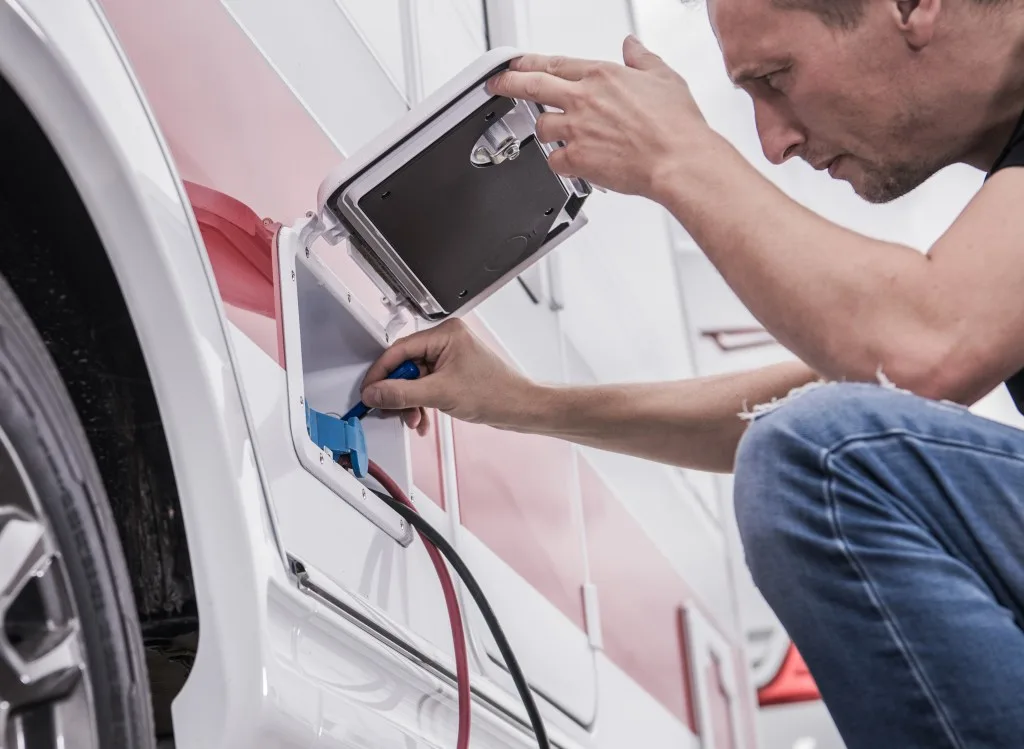
#3 Know Thy Grey Tank
Living in a house, you don’t typically realize how much water you go through. After all, it stops being your responsibility once it goes down the drain. But your RV has a grey tank with limited capacity. Depending on its size and your water usage, you might need to empty your tank more often than you’d like.
Grey tanks can fill up quickly even if you’re consciously conserving water, but there are some things you can do. Brooks Smothers, host of the RV Out West podcast, talks about being mindful and offers an excellent hack for reducing water usage.
“Grey tank size matters: Our first trips out we didn’t know better about selecting a “full hook up” site and we just got 30 amp/water and we were amazed at how quickly we would fill our grey tank. I thought we were doing good about being mindful of our usage, but it still just filled up so fast.
We’ve since swapped out the shower head to include one that we can stop the water flow while shampooing, as an example, and that helps to some degree. “
#4 Payload Knowledge
RV weight and your truck’s towing capacity are certainly important. But knowing and staying under your max payload can make the difference between an easy ride or needing a tow. Payload is how much weight your RV can handle beyond its curb weight (weight of the RV itself with nothing else in it.)
The payload includes you and your passengers, any liquid in your tanks – water and fuel, cooking equipment, clothes, food in your fridge, furniture, and hiking gear. Literally, it’s everything you’ve added to your RV from the time you bought it.
If your payload plus your curb weight total goes beyond your GVWR (Gross Vehicle Weight Rating), you could cause serious damage to your RV.
Becky and Fabian from Proceeding Onward in America agree!
“Payload! Understanding your towing capacity and knowing the weight of your RV is important; however, knowing what payload is, what it includes, and how it can affect the tow vehicle [are just as important].”
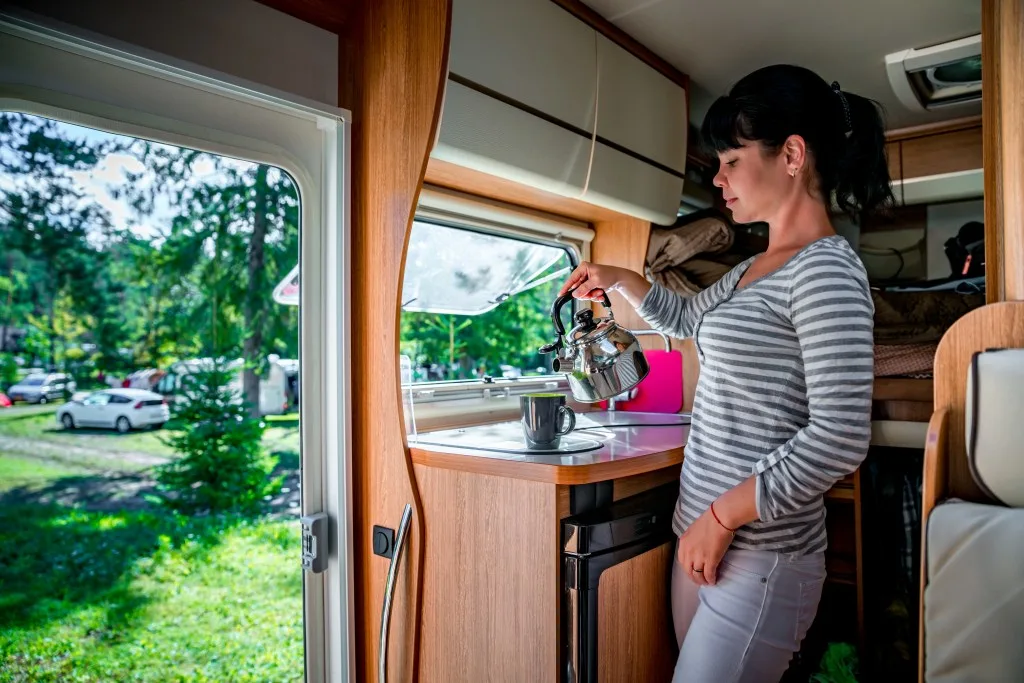
#5 Leaves You Wanting More
Many of us dream about nomadic life, truly living on the road in our RVs. But that’s not always practical for everyone. Maybe you want your kids to stay in public school. Or, you haven’t yet figured out how to work while traveling. Or possibly it just isn’t the right time for you.
So you buy an RV and plan some long vacations, taking a week or two here and there. Then you return home only to start longing and planning for that next trip out to explore the world. Red and TJ of Loving Life Hitched Up know exactly how that feels.
“The one thing we wish we would have known prior to buying our first RV is that it becomes addictive and the time you have to use it conflicts with the amount of time you want to use it.
We knew we would enjoy using it and our summer adventures would be great and it has become emotionally challenging to have to go back home to “regular life” only to try and figure out how and when we can get back out on the road. So plan on fighting the urge to just hit the road and go full time, if you’re not at that point in life.”
#6 Failures Happen Often
If you love fixing things yourself, you’re in luck! RVs are generally made for a few short-term uses yearly. Living in them long-term or full-time means things break – often. Even a brand new RV will likely have issues sooner than later because they’re not meant to be driven and used that much.
As Joe Coffin from Let’s Head Wherever says, it might be wise to brush up on some basics before you jump onto the open road.
“I wish I knew the frequency of component failures and things that would break on a brand new RV. Learning basic electrical wiring, plumbing, and carpentry skills BEFORE owning an RV would’ve been better than learning on the fly!”
Pro Tip: Unfortunately, in your RV will break. We spoke to an RV mechanic, these are the RV systems he says will break first.
#7 Tail Swing
Do you know that part of your RV that hangs off the back of your rear axle? That section swings wide in the opposite direction of your turn and can destroy whatever it hits.
Knowing how far forward to pull and how much space to leave in your turn makes all the difference, as Jason Wyatt from the Touring Freedom podcast now knows.
“I wish I had known about tail swing. This isn’t something commonly discussed, but the amount of overhang on your rig that is past your axles will swing the opposite direction when you’re in a tight turn.
That may sound like common sense, but it may take some getting used to how far away from something on your right you need to be so that you can turn left!”
#8 Power Consumption
Getting power to your various appliances and electronics can be tricky, especially if you’re boondocking. What might work most days could run your generator dry on a hot or cold day. Running two a/c units on 30 amp or an a/c and a microwave at the same time could blow a fuse or worse.
Sherryl Nens of Bright Dais Ahead learned about her RV’s power limits the hard way!
“Wish we would have known a little bit more about power consumption. Specifically in regards to owning a residential fridge vs an RV fridge. We had a generator and thought we were covered but you can drain propane fast that way and then run batteries dry.
We had one terrible boondocking experience where we ran out of propane and killed our batteries in 1.5 days and 90-degree heat.
Even just learning what you can run on 30amp vs 50amp. And slightly off subject of power but it uses a lot of brainpower is needing to have a good WiFi solution as you can’t rely on what comes in the RV or on campgrounds.”
Pro Tip: RV electric systems have many nuances that can majorly impact your travels. Be careful to: Avoid These 5 RV Electrical Mistakes.
#9 It Takes A Lot of Planning
The gypsy life isn’t as easy as it used to be since the RV boom started a few years ago. More people in the RV parks and best boondocking spots means having to plan and have backup options. In addition, a bigger RV intensifies that need since you might not fit into some campgrounds.
If you have a remote job, you need to plan to stay where you can access the Internet. With most RVs, you’ll need to ensure you’re taking a route that your rig can make it through, avoiding low overpasses or tight turns.
Do you have kids or pets with you? Then you’ll definitely need to figure out when to take bathroom and lunch breaks.
Laurence of Brazen Bits certainly learned many of these lessons.
“We have a 37’ travel trailer and totally underestimated how much planning and forethought you need to do for things that you take for granted in just a car. Things like getting gas, restroom breaks, not taking wrong turns. Yes, we’ve blocked entire gas stations.
Yes, we’ve had to stop on an on-ramp to use the restroom, and yes, we’ve had to backup on tight streets after a wrong turn. We’re embarrassed about all these things, but we have definitely learnt from them”
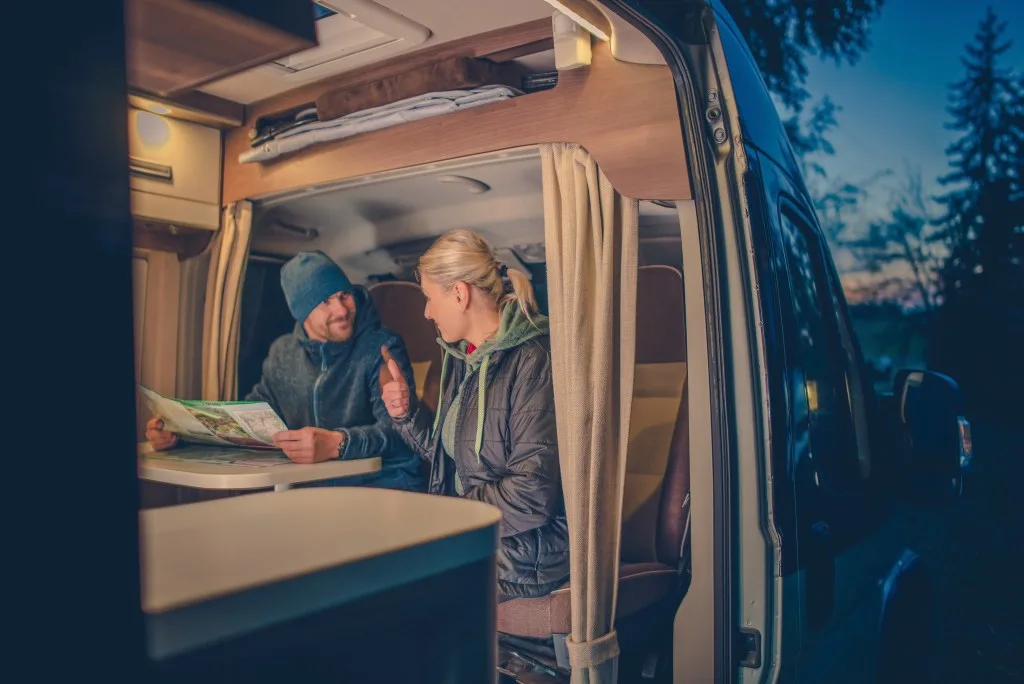
#10 Don’t Buy New
Besides the warranty issues mentioned above, the instant depreciation on a new RV may keep you stuck in something far longer than you want. Before you buy your RV, you don’t know what you like or dislike, what works and what doesn’t.
The odds of you wanting a different RV after camping or living in your first for a while are fairly high, as The Crazy Outdoor Mama, Stacy Bressler, suggests.
“Don’t buy new – if you don’t like it, you’ll sell it soon. If you love it, you’ll end up upgrading (and selling the first.) Avoid getting upside down on your first camper and buy used so it’s easy to sell or trade up for something you really want later.”
#11 It’s About the People
As you work toward your RVing dream, whether it’s for short trips or full-time RV living, you envision all the amazing places you’ll explore.
Surprisingly, though, some of your fondest memories as you look back will be of the people you’ve met along the way. Dan and Taylor Schlesinger of Nomads in Nature share the same sentiment.
“RV life is more about the people you meet than the places you see. We have loved traveling the country and seeing so many amazing parks and towns, but it’s the people around you that make life special. RVers are some of the nicest people you will ever meet.
Invite your neighbors to a bonfire, share some beers, share some stories, and enjoy. Don’t be upset if someone parks their rig close to you. They might be your new best friends in a couple days.”
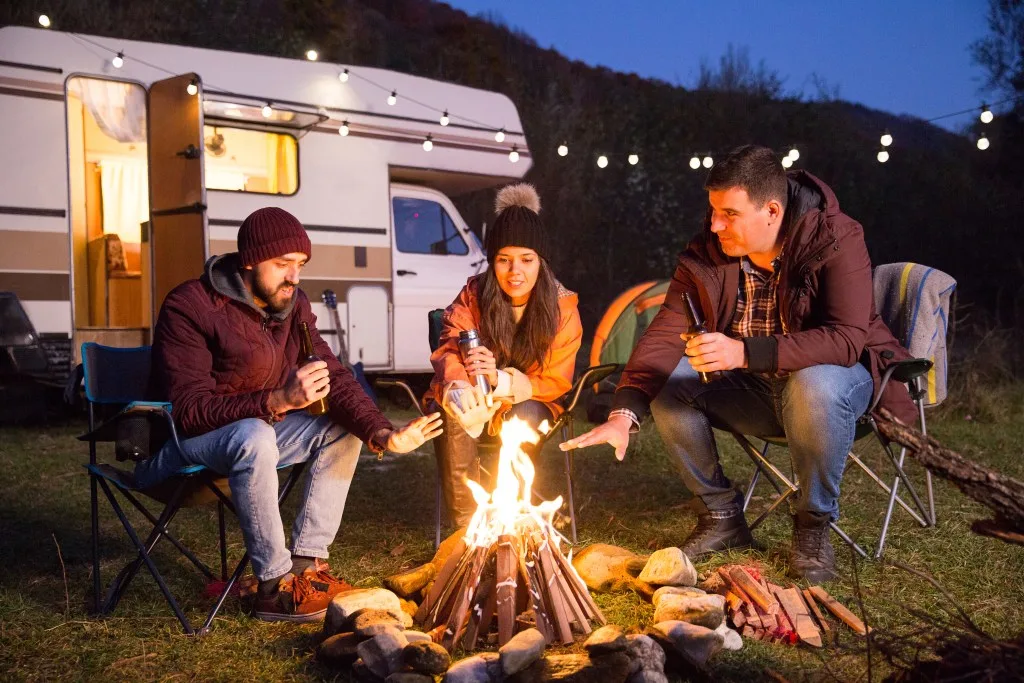
#12 Roof Space
Roof space is limited, especially on smaller RVs such as Class B vans. If you want to add solar panels, try to think about the future. What else would you want to put on your roof? Fans or a/c units? A satellite or other antenna? Maybe even a rooftop deck?
Joni Zander, from The Galavan, suggests thinking it through before putting holes in your roof.
“I wish I had known everything I’d want on my roof and to plan out my roof before building out my van. It’s so much easier to fit all the solar needed if you know everything you’re going to be putting on your roof before cutting holes for fans.”
#13 Toys Can Be Challenging
Even with a toy hauler, bringing toys such as motorcycles or an ORV can be a bit difficult. Most toy haulers are longer, so you have to deal with finding the right space. Or, what if you’re towing a toy trailer behind your Class A? Are you allowed to store the trailer at your site if you can find one long enough?
Even just loading and unloading your toys or finding places to have them repaired is more difficult on the road, as Lisa Brown of Always n Liberty discusses.
“We wished we knew how much of a challenge it would be to take our Harley Davidson motorcycles (2) in our RV travels.
From finding long enough sites to load and unload, maintenance logistics, getting parts on the road, not knowing the roads, etc. We even ran into campgrounds that disallowed motorcycles making it frustrating in some places.”
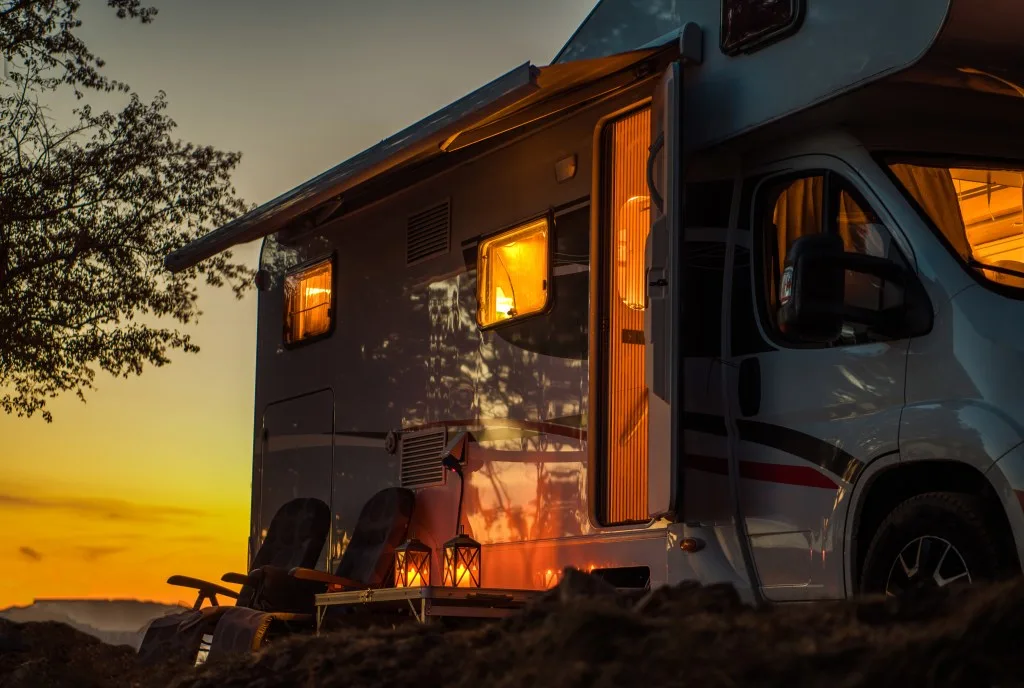
There’s a Lot to Know Before Buying Your RV
We’ve learned from our fellow RVers that there are many things to know before purchasing an RV. Many of us didn’t know these things about our RV or the RVing lifestyle beforehand, though. But we still love being out there exploring and meeting new people.
What’s the one thing you wish you’d known before you bought your RV?
Discover the Best Free Camping Across the USA
To be honest with you, we hate paying for camping. There are so many free campsites in America (with complete privacy).
You should give it a try!
As a matter of fact, these free campsites are yours. Every time you pay federal taxes, you’re contributing to these lands.
Become a FREE CAMPING INSIDER and join the 100,000 campers who love to score the best site!
We’ll send you the 50 Best Free Campsites in the USA (one per state). Access the list by submitting your email below:
We purchased a 36 Ft class A 2003 Winnebago last summer without having the roof inspected. A few weeks later I started researching Winnebagos so I could become familiar with mechanical issues to prepare myself for upcoming road trips. Well, after reading about issues with the roofs, I scheduled a roof inspection. I almost had a stroke when I saw the repair (replacement) quotes for the fiberglass roof that I was told needed to be replaced. Quotes anyware from $8,000 to $17,000. My plead to all RVers is this. Pay the extra money to have an independent trained inspector give your upcoming investment a good going over prior to your purchase. We are not in a financial position to hand over the replacement cost and will need to save, save, save. Now, our dreams of travel will need to be put on a long hold until the roof is taken care of. Please have your RV inspected before purchase!!!!!